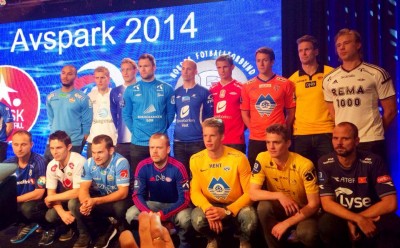Norwegian premier league football is bleeding money, fans aren’t going to matches, TV audiences have halved and the teams don’t rate in the international arena. As the 2014 season gets underway executives are hopeful football will become “trendy” again this year, regaining the popularity it enjoyed in the late 2000s.

The figures are dire, reported newspaper Aftenposten. Revenues are about NOK 500 million (USD 83 million) lower than they were in 2008, average attendance at matches has dropped from 10,500 in 2007 to 6,800 last year, and viewers of TV2’s Sunday night match have halved since the game moved forward one hour to a seven o’clock time slot, in competition with the evening news on rival state broadcaster NRK.
Half-a-million fewer fans went to matches in 2013 compared to 2009, after the premier league was expanded to 16 teams. Few other changes have been made to the competition structure over the past seven years and fans have as much purchasing power today as they did in 2007, but predictions that Norwegian football would continue to grow have proved false. The national team has failed to break into major international tournaments, and Norwegian teams have had little success in European competitions.
“We have fallen asleep in class,” admitted the newly re-elected football federation (NFF) President, Yngve Hallén. As well as fans’ fading interest in the sport, the credibility of the NFF’s leadership has taken a beating. “I don’t think it’s possible to fall lower than we are,” agreed TV2’s sports editor Vegard Jansen Hagen.
No longer cool
Sports sociologist Arve Hjelseth from the Norwegian University of Science and Technology (Norges teknisk-naturvitenskapelige universitet, NTNU) in Trondheim told Aftenposten it simply isn’t “trendy” to go to football matches any more. “In 2007 every B-grade celebrity who wanted a little credibility had a team that they’d followed since the ’70s, even though that wasn’t always true,” said Hjelseth. “The boom from that period never came back. Trends have the factor of fading and disappearing.”
Hjelseth said the late 2000s boom was unexpected, and the level of interest in recent years is actually more normal for Norwegian football. He pointed out that there are still many spectators in Norwegian stadiums compared to other countries, but noted there is a growing trend for football fans to travel to England, Barcelona or Germany for matches, rather than following the local league.
Hagen said Sunday night football viewers had dropped from an average of 520,000 in 2007 and 2008 to 222,000 last year. TV2 no longer has exclusive rights to broadcast football, after part of the premier league rights were sold to C More. Hagen blamed the waning interest on a lack of positive experiences, high profiles and distinct identities among top level clubs, and a lack of teams from the major cities.
Hagen said that wasn’t a criticism of the formidable job the smaller clubs had done. “But the way the large ones have managed their resources is frightening,” he said. “Among other things, we’re paying the price because Brann, Vålerenga, Rosenborg and Viking have not been stable over time, giving us the runs you now see in Spain and England. That’s what you must have.”
Product development
Hallén said rebuilding the big city teams is one way of restoring interest in the league. “When the biggest teams go forward, you get a more solid series. When Vålerena fights for the gold, it will be almost full at Ullevaal every time.”
Interest organization Norsk Toppfotball (NTF), which also estimated losses of half a billion in revenue since 2008, brought in a new director from the business world at the start of the year. Leif Øverland has traveled throughout Norway since January, asking clubs what went wrong.
“Some said the money came too fast,” Øverland told Aftenposten. “Suddenly we got football billions. We couldn’t handle the transition. Then came some outrageous investment in facilities.” He said managers forgot about the football, and started measuring success on how big they could build. “That’s one thing I heard. The other was it became insufficient locally and regionally. There was little focus on talent development against player logistics. We should be the world champions in going out and buying.”
Øverland said to make football stars, Norway must be best at product, player and coach development. Hallén agreed the focus of the 1990s and 2000s was on building the product and spending money on infrastructure and the audience experience. He said when that was all in place, product development stopped. But he told Aftenposten the falling revenue was not his major concern. “It’s more important to create resilience in the clubs and a bottom line which is good,” Hallén said. “This resilience is much more important than how big the turnover is.”
Hagen said Norwegian football had fallen so far, they only way to go was up. He said in the past major issues were simply overlooked, and there wasn’t enough healthy criticism of the way things were handled. “We accepted that football imposed rules which belong in completely different leagues and spheres,” he said. “We accepted there was a use of money that you would not get away with in any place, other than in football’s name.”
newsinenglish.no/Emily Woodgate

